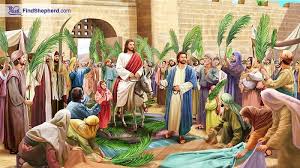 Psalm 24
Psalm 24
“The earth is the Lord’s, and all it contains, the world, and those who dwell in it. 2 For He has founded it upon the seas and established it upon the rivers. 3 Who may ascend into the hill of the Lord? And who may stand in His holy place? 4 He who has clean hands and a pure heart, who has not lifted up his soul to falsehood and has not sworn deceitfully. 5 He shall receive a blessing from the Lord and righteousness from the God of his salvation. 6 This is the generation of those who seek Him, who seek Your face—even Jacob. Selah. 7 Lift up your heads, oh gates, and be lifted up, oh ancient doors, that the King of glory may come in! 8 Who is the King of glory? The Lord strong and mighty, the Lord mighty in battle. 9 Lift up your heads, oh gates, and lift them up, Oh ancient doors, that the King of glory may come in! 10 Who is this King of glory? The Lord of hosts, He is the King of glory. Selah.”
This psalm begins with a universal statement, confirming that there is one God. He made all that is seen and unseen, and he rules over them. “The earth is the Lord’s, and all it contains, the world, and those who dwell in it. For He has founded it upon the seas and established it upon the rivers.” (verses 1-2)
Now, David addresses the subject of his instruction: “Who may ascend into the hill of the Lord? And who may stand in His holy place?” (verse 3) The “hill of the Lord” refers to Mt. Zion, upon which the city of Jerusalem sits. It will be the home of Christ the King, and his faithful followers, on the refurbished earth that is to come after the destruction of this edition of the earth during the last 7 years on earth, the “Tribulation.” This period of time is called “the Day of God’s Wrath.” His patience with the evil upon this earth will come to an end, just as in the days of Noah. The current city will be destroyed and replaced with a New Jerusalem, which Christ has prepared for those who love him to dwell in with Him forever.
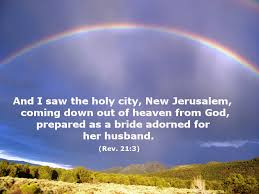 The prophets Ezekiel, Isaiah, and Zechariah gave precise details of its size and beauty. It shall be the capital of the world from where Christ will rule and maintain peace on earth. The Apostle John gives a thorough explanation in his Book of Revelation: “I did not see a temple in the city, because the Lord God Almighty and the Lamb are its temple. The city does not need the sun or the moon to shine on it, for the glory of God gives it light, and the Lamb is its lamp. The nations will walk by its light, and the kings of the earth will bring their splendor into it. On no day will its gates ever be shut, for there will be no night there. The glory and honor of the nations will be brought into it. Nothing impure will ever enter it, nor will anyone who does what is shameful or deceitful, but only those whose names are written in the Lamb’s book of life.” (Revelation 21:22-27)
The prophets Ezekiel, Isaiah, and Zechariah gave precise details of its size and beauty. It shall be the capital of the world from where Christ will rule and maintain peace on earth. The Apostle John gives a thorough explanation in his Book of Revelation: “I did not see a temple in the city, because the Lord God Almighty and the Lamb are its temple. The city does not need the sun or the moon to shine on it, for the glory of God gives it light, and the Lamb is its lamp. The nations will walk by its light, and the kings of the earth will bring their splendor into it. On no day will its gates ever be shut, for there will be no night there. The glory and honor of the nations will be brought into it. Nothing impure will ever enter it, nor will anyone who does what is shameful or deceitful, but only those whose names are written in the Lamb’s book of life.” (Revelation 21:22-27)
 Then, David describes the character of the people blessed and chosen to dwell with the Lord, “He who has clean hands and a pure heart, who has not lifted up his soul to falsehood and has not sworn deceitfully.” (verse 4) To have “clean hands” means that we do not involve ourselves with “dirty deeds.” To have a “pure heart” means that we do not allow our minds to even consider evil. For our God looks into the hearts of His people. He sees more than only our deeds. He sees our hearts’ intent. In the Apostle Paul’s wonderful description of Godly love, we are warned that if we do good but with a resentful heart, it accounts for nothing. “If I speak in the tongues of men or of angels, but do not have love, I am only a resounding gong or a clanging cymbal. If I have the gift of prophecy and can fathom all mysteries and all knowledge, and if I have a faith that can move mountains, but do not have love, I am nothing. If I give all I possess to the poor and give over my body to hardship that I may boast, but do not have love, I gain nothing.” (1 Corinthians 13:1-3)
Then, David describes the character of the people blessed and chosen to dwell with the Lord, “He who has clean hands and a pure heart, who has not lifted up his soul to falsehood and has not sworn deceitfully.” (verse 4) To have “clean hands” means that we do not involve ourselves with “dirty deeds.” To have a “pure heart” means that we do not allow our minds to even consider evil. For our God looks into the hearts of His people. He sees more than only our deeds. He sees our hearts’ intent. In the Apostle Paul’s wonderful description of Godly love, we are warned that if we do good but with a resentful heart, it accounts for nothing. “If I speak in the tongues of men or of angels, but do not have love, I am only a resounding gong or a clanging cymbal. If I have the gift of prophecy and can fathom all mysteries and all knowledge, and if I have a faith that can move mountains, but do not have love, I am nothing. If I give all I possess to the poor and give over my body to hardship that I may boast, but do not have love, I gain nothing.” (1 Corinthians 13:1-3)
The good deeds we Christians do in being examples of Christ’s love, are deeds stimulated by the love of God through the Holy Spirit living in our hearts. Therefore, we are told, “Follow God’s example, therefore, as dearly loved children and walk in the way of love, just as Christ loved us and gave himself up for us as a fragrant offering and sacrifice to God. But among you there must not be even a hint of sexual immorality, or of any kind of impurity, or of greed, because these are improper for God’s holy people. Nor should there be obscenity, foolish talk or coarse joking, which are out of place, but rather thanksgiving. For of this you can be sure: No immoral, impure or greedy person—such a person is an idolater—has any inheritance in the kingdom of Christ and of God.” (Ephesians 5:1- 5)
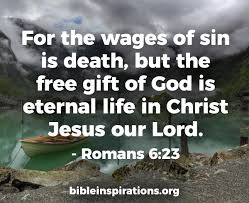 A person who has “clean hands” and a “pure heart” knows God intimately. The closer we get to His light the more darkness and evil intent is removed from us. A truly born-again Christian experiences a greater love, passion and concern for others than they have ever known before. The “Agape” love of our righteous creator dwells in us and overcomes the sin that drives others away from God and into eternal darkness. Consequently, we cannot take pride in the good that we do; for, it is God’s love that motivates and directs us to do these good things. “For it is by grace you have been saved, through faith – and this not from yourselves, it is the gift of God – not by works, so that no one can boast. For we are God’s workmanship, created in Christ Jesus to do good works, which God prepared in advance for us to do.” (Ephesians 2:8-10)
A person who has “clean hands” and a “pure heart” knows God intimately. The closer we get to His light the more darkness and evil intent is removed from us. A truly born-again Christian experiences a greater love, passion and concern for others than they have ever known before. The “Agape” love of our righteous creator dwells in us and overcomes the sin that drives others away from God and into eternal darkness. Consequently, we cannot take pride in the good that we do; for, it is God’s love that motivates and directs us to do these good things. “For it is by grace you have been saved, through faith – and this not from yourselves, it is the gift of God – not by works, so that no one can boast. For we are God’s workmanship, created in Christ Jesus to do good works, which God prepared in advance for us to do.” (Ephesians 2:8-10)
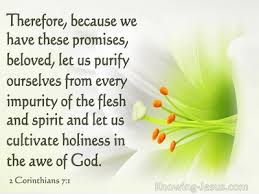 The next part of this verse requires explanation and application. “who does not trust in an idol or swear by a false god.” (verse 4) Idolatry is not only the worship of images. Certainly, that was a major issue in the days of the Old Testament. There were idols and false Gods everywhere. God’s chosen people were commanded to destroy all idols and false gods. “Break down their altars and smash their sacred pillars. Burn their Asherah poles and cut down their carved idols. Completely erase the names of their gods!” (Deuteronomy 12:3) However, God did not limit the definition of ‘idols and false gods’ to just images of religious worship and adoration. As we just read in Ephesians, “No immoral, impure or greedy person—such a person is an idolater—has any inheritance in the kingdom of Christ and of God.” (Ephesians 5:5) All sins are acts of idolatry. Immoral people worship the god of sex, thievery, lying, slander, anger, money, politics, oppression, bigotry, … They are “greedy” because they serve themselves and material things as god. They have fleshly, selfish desires and passions that are satisfied without any concern for the damage caused to others. This is human nature. That is why Jesus said that we “must be born again,” not by the flesh but of the Spirit of God’s holiness.
The next part of this verse requires explanation and application. “who does not trust in an idol or swear by a false god.” (verse 4) Idolatry is not only the worship of images. Certainly, that was a major issue in the days of the Old Testament. There were idols and false Gods everywhere. God’s chosen people were commanded to destroy all idols and false gods. “Break down their altars and smash their sacred pillars. Burn their Asherah poles and cut down their carved idols. Completely erase the names of their gods!” (Deuteronomy 12:3) However, God did not limit the definition of ‘idols and false gods’ to just images of religious worship and adoration. As we just read in Ephesians, “No immoral, impure or greedy person—such a person is an idolater—has any inheritance in the kingdom of Christ and of God.” (Ephesians 5:5) All sins are acts of idolatry. Immoral people worship the god of sex, thievery, lying, slander, anger, money, politics, oppression, bigotry, … They are “greedy” because they serve themselves and material things as god. They have fleshly, selfish desires and passions that are satisfied without any concern for the damage caused to others. This is human nature. That is why Jesus said that we “must be born again,” not by the flesh but of the Spirit of God’s holiness.
 Jesus was asked, “Teacher, which commandment is the greatest in the Law?” Jesus declared, “Love the Lord your God with all your heart and with all your soul and with all your mind. This is the first and greatest commandment. And the second is like it: ‘Love your neighbor as yourself.” (Matthew 22:37-38) If Jehovah is truly our God, then we are obliged to seek Him, and to revere and to honor Him above all people and things. Our hearts’ primary desire always is to please God by doing what he asks: Love Him and others. Seek to serve humanity as our Lord Jesus demonstrated. Put the needs of others before our own. As the apostle Paul so eloquently said, “Do nothing out of selfish ambition or empty pride, but in humility consider others more important than yourselves. Each of you should look not only to your own interests but also to the interest of others. Let this mind be in you which was also in Christ Jesus.” (Philippians 2:4)
Jesus was asked, “Teacher, which commandment is the greatest in the Law?” Jesus declared, “Love the Lord your God with all your heart and with all your soul and with all your mind. This is the first and greatest commandment. And the second is like it: ‘Love your neighbor as yourself.” (Matthew 22:37-38) If Jehovah is truly our God, then we are obliged to seek Him, and to revere and to honor Him above all people and things. Our hearts’ primary desire always is to please God by doing what he asks: Love Him and others. Seek to serve humanity as our Lord Jesus demonstrated. Put the needs of others before our own. As the apostle Paul so eloquently said, “Do nothing out of selfish ambition or empty pride, but in humility consider others more important than yourselves. Each of you should look not only to your own interests but also to the interest of others. Let this mind be in you which was also in Christ Jesus.” (Philippians 2:4)
It is with this understanding that readies us for the next verse of Psalm 24, “He shall receive a blessing from the Lord and righteousness from the God of his salvation. This is the generation of those who seek Him, who seek Your face—even Jacob. Selah.” (verses 5-6) Living for God, instead of for ourselves, has great rewards. The first blessing we receive when we turn away from serving ourselves and repent of our sins is “righteousness.” When any sinner confesses his immoralities, impurities and greed to Jesus Christ, their sins are forgiven and forgotten. “If we confess our sins, he is faithful and just and will forgive us our sins and purify us from all unrighteousness.” (1 John 1:9) We are “purified” by the Holy Spirit, day by day, as we die to ourselves and live for others. But first we are made righteous as a gift from our Savior. “For it is by grace you have been saved, through faith–and this is not from yourselves, it is the gift of God” (Ephesians 2:8-9)
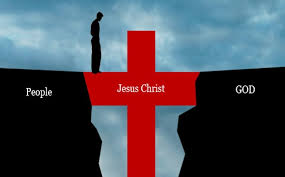 The Great News! Of the message of Christ is that simply by truly believing in Him we are saved from death and receive the gift of eternal life in the presence and the paradise of God! This is the same way that all peoples have received forgiveness, righteousness and salvation. Just as father Abraham was saved, we are too, “And he believed the Lord, and he counted it to him as righteousness.” (Genesis 15:6)
The Great News! Of the message of Christ is that simply by truly believing in Him we are saved from death and receive the gift of eternal life in the presence and the paradise of God! This is the same way that all peoples have received forgiveness, righteousness and salvation. Just as father Abraham was saved, we are too, “And he believed the Lord, and he counted it to him as righteousness.” (Genesis 15:6)
The closing verses of Psalm 24 are particularly beautiful. Once again, David the seer and prophet, shares the vision God has given to all of the prophets, apostles and believers in Christ, His triumphant return. “Lift up your heads, oh gates, and be lifted up, oh ancient doors, that the King of glory may come in! 8 Who is the King of glory? The Lord strong and mighty, the Lord mighty in battle. Lift up your heads, oh gates, and lift them up, Oh ancient doors, that the King of glory may come in! Who is this King of glory? The Lord of hosts, He is the King of glory. Selah.” (verses 7-10) These “gates” and “doors” refer to one of the various entrance ways into the ancient city. The oldest of the current gates in Jerusalem’s Old City Walls is the Golden Gate. It is prophesied that Christ will come through the eastern Gate, when the Anointed One (King Jesus) comes. Indeed, this is the gate whereby Jesus entered the Temple area the day before his crucifixion, when the people shouted, “Hosanna! to the Son of David! Blessed is he who comes in the name of the Lord!” Hosanna in the highest heaven!” (Matthew 21:9) The meaning of “Hosanna” is “Salvation has come!” The people thought the this was the fulfillment of Ezekiel’s prophecy and that God’s Prince was coming to establish Jerusalem as His capital and rule the world in righteousness. They did not yet understand that Isaiah’s prophecy of Christ, coming to be crucified to die for our sins, had to be fulfilled first. The vision that Ezekiel had in his chapters 43 & 44 refer to when Jesus comes a second time as our King, when He will renew the earth into a place of beauty, peace and joy. The prophet Ezekiel saw this in a vision, “Then he (an angel) brought me back the way of the gate of the outward sanctuary which looks toward the east; and it was shut. Then said the Lord unto me; this gate shall be shut, it shall not be opened, and no man shall enter in by it; because the Lord, the God of Israel, hath entered in by it, therefore it shall be shut.” (Ezekiel 44:1–3) After Jesus entered the Temple area through this gate, and after he was crucified, many years later a Muslim Sultan had the gate sealed close. It has not been opened since. This fulfills the prophecy that the gate will be shut.
Here is Ezekiel’s vision of Jesus coming through the Golden Gate when He returns to rule, “Then the man (angel) brought me to the gate facing east, and I saw the glory of the God of Israel coming from the east. His voice was like the roar of rushing waters, and the land was radiant with his glory. I fell face down. The glory of the Lord entered the temple through the gate facing east. Then the Spirit lifted me up and brought me into the inner court, and the glory of the Lord filled the temple … While the man (angel) was standing beside me, I heard someone speaking to me from inside the temple. He said: “Son of man, this is the place of my throne and the place for the soles of my feet. This is where I will live among the Israelites forever.” (Ezekiel 43:1-7)
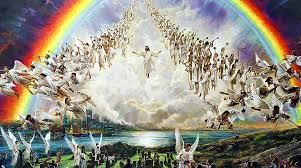 Psalm 24 instructs us in the ways of salvation and righteousness. Then it closes with the wonderful promise of Christ’s triumphal return to bring peace to the world. That day is very near. It is essential that we all examine ourselves and ask, “Am I ready for the coming of the ‘King of Glory?”
Psalm 24 instructs us in the ways of salvation and righteousness. Then it closes with the wonderful promise of Christ’s triumphal return to bring peace to the world. That day is very near. It is essential that we all examine ourselves and ask, “Am I ready for the coming of the ‘King of Glory?”
Mark Baird

